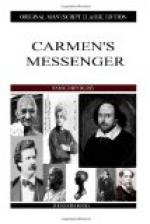“But he can’t fight,” Featherstone objected in a strained voice. “I’d have urged him to do so, if it had been possible. We’re not cowards.”
“Why is it impossible?”
“Don’t you know?” Featherstone asked with some surprise.
“I know my partner’s in trouble; that’s all.”
Featherstone hesitated, as if he wanted to take the other into his confidence, but shrank from doing so. Then he said with forced quietness: “If this rogue knows as much as I suspect, he can get my son arrested.”
“On a serious charge? I don’t ask what it is.”
“It would mean a long imprisonment, to say nothing of the humiliation,” Featherstone answered brokenly, and was silent for a minute with the firelight on his tense face. Then he went on with an effort: “I must tell you what I can. Lawrence in a desperate moment injured, I had better call it robbed, a relative of ours. The boy had got into difficulties, but hitherto, although he had been a fool, there was a certain generosity in his rashness. He was very hard pressed—I have seen that since—but I can make no excuse for what he did.”
“He made good afterwards,” Foster interposed.
“We tried to think so, but it looks as if one can’t make good. The punishment for a wrong done, or consented to, must be borne. Well, when I learned the truth I went to the man my son had robbed and offered to repay him. He said he would take no money, for reasons that I ought to grasp, and sent me away afraid, because I knew he was hard and very just.”
Featherstone paused, and Foster, who murmured a few words of awkward sympathy, waited until he resumed; “I am a magistrate, pledged to do my duty, but I helped my boy to escape, and the man I was afraid of did nothing, though he knew. After a time, I went to him again, and he gave me to understand that he would not interfere so long as Lawrence stayed away, but must be free to take the proper line if he came back. It’s plain now that he knew my son’s faults and meant to give him the chance of overcoming them by hard work in Canada. At last, when he was very ill, he sent for me and said I could let Lawrence know he was forgiven.”
“Ah!” said Foster, “now I understand what my partner meant.”
“This was not long before you came,” Featherstone continued. “It was a wonderful relief to know the danger was over, and then you told us how Lawrence had grown out of his folly and become a useful man. Although we longed to see him, our satisfaction was complete. Now this letter comes, and I fear my wife is unable to bear the strain again.”
Foster was moved by his distress. Featherstone was proud and honorable, and it must have cost him much to help his son to steal away. Indeed, Foster thought what he had done then would always trouble him, and after all it had proved useless. The worst was that his sensitive uprightness might make him an easy victim of the unscrupulous adventurer. But Foster did not mean him to be victimized. As a rule, he was rather humorous than dramatic, but he got up and stood with his hands clenched.




